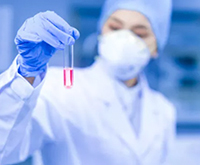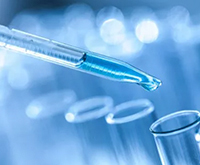Creatine Kinase-MB (CKMB)
Creatine kinase isoenzymes are an enzyme component, among which MB type is mainly present in myocardial cells. It is also a kind of cardiac marker.
CK-MB protein is of great significance in clinical diagnosis. The serum creatine kinase level increases rapidly in various diseases, including muscular atrophy and myocardial infarction. The determination of creatine kinase activity is more reliable than electrocardiogram in the diagnosis of myocardial infarction. In myocardial infarction, creatine kinase increased within six h of onset, peaked at 24 h, and returned to normal within 3-4 days.
The isoenzyme CK-MB of creatine kinase has the highest specificity in diagnosis. Creatine kinase has attracted extensive attention and in-depth research because of its essential physiological function and clinical application value.
Sekbio provides related detection raw materials: Mouse anti-human CKMB mAb and Humanized anti-human CKMB mAb.

Creatine Kinase-MB (CKMB Protein) Products
| Antibody | Application |
| Mouse Anti-human CKMB mAb | For immunodiagnostic: ELISA, LFA, CLIA |
| Humanized Anti-human CKMB mAb |
What is Creatine Kinase MB?
The creatine kinase molecule is a dimer consisting of a brain-type subunit (B) and a muscle-type subunit (M). Normal human tissues often contain three isoenzymes, which are CK-BB (CK1), CK-MB (CK2), and CK-MM (CK3) in the order of electrophoresis. CK-MB protein mainly exists in myocardial tissue, accounting for 0-4% of CK in serum. CK and CK-MB are sensitive indicators of myocardial tissue damage, especially CK-MB is more specific. The increase of creatine kinase mb antibody mainly causes the growth of CK during myocardial injury.
CK-MB Protein
Creatine kinase is one of the essential indicators of laboratory tests. When the myocardial tissue is seriously damaged, CK-MB is released into the blood, and the serum CK-MB protein becomes a vital criterion for diagnosing acute myocardial infarction.
Increased serum CK-MB protein is common in acute myocardial infarction, skeletal muscle injury, trauma, strenuous exercise, etc. Serum CK-MB can also be increased in malignant fever patients and some members of their families. In patients with rhabdomyosarcoma, serum CK-MB protein can be significantly increased. In addition, cardiac surgery that damages the myocardium may have a transient increase in CK-MB, which usually returns to normal within 24 hours after surgery.
- Cardiac Markers
-
Tumor Marker
-
PGII
-
G17
- CA50
-
CA125
- CA242
-
CA15-3
- CA19-9
- CA72-4
-
Pepsinogens I (PGI)
-
Human Epididymis 4 (HE4)
- Prostate-Specific Antigen (PSA)
- Squamous Cell Carcinoma (SCC)
- Neuron-Specific Enolase (NSE)
- Cytokeratin 19 Fragment (CYFRA21-1)
- Human Progastrin-releasing Peptide (ProGRP Tumor Marker)
- Protein Induced by Vitamin K Absence or Antagonist-II (PIVKA II Tumor Marker)
- Alpha-fetoprotein(AFP)
-
CEA
-
Human Chitinase 3-like 1
-
PGII
- Inflammatory Marker
- Infectious Disease
- Hormones
- Thyroid Function
- Glucose Metabolism
- Bone Marker
- Others
-
Heterophilic Blocking Reagent
- Animal Diagnostics

















